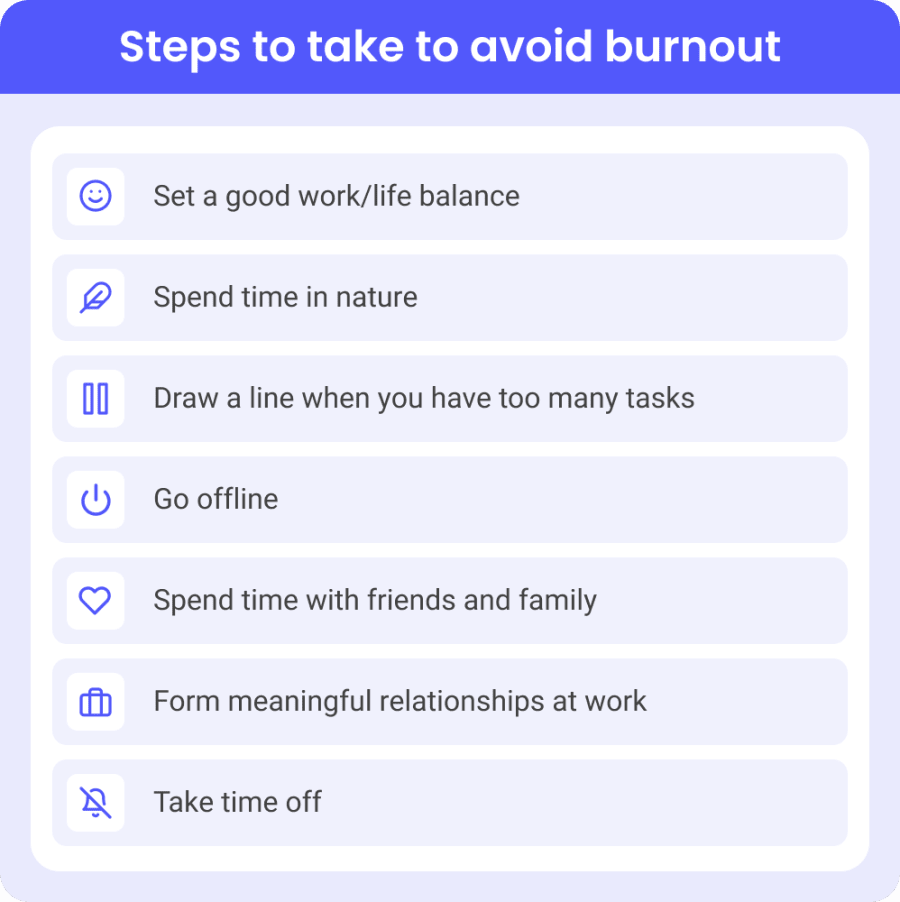If you are an adult that has worked more than a couple of years in any industry, chances are, you have experienced burnout or you know someone who has. The risk factors for burnout have increased since the Covid-19 pandemic, as working from home created an unhealthy work environment and the inability to shut down from work whilst at home for many people.
The burnout stats increase by the day due to several reasons, such as absence from an environment of idea-sharing, productivity, and consulting colleagues, but also other more elementary reasons like leaving the house for a few hours and working in a professional environment.
A Deloitte survey of 1,000 full-time workers across different sectors in the United States revealed that more than 77 percent had experienced burnout at their current job, with more than half having experienced it more than once.
In fact, 77% out of 1000 respondents of a survey by Deloitte said they are experiencing burnout at their current workplace. A staggering number of 91% said that their quality of work is impacted by an unmanageable amount of stress, and 83% believe that burnout impacts their relationships, even out of the workplace.
Additionally, software engineers are not exempt from a heavy workload resulting in job burnout. A survey by DevOps.com revealed that 83% of software developers feel burnout from their work. Among the main reasons for their burnout, they named an unattainable workload and a poor work culture, as well as the stress associated with the pandemic.
These findings make it more than clear that burnout is an important health problem for many people. We all spend a significant amount of time at work, and the least we can do is learn how to spot burnout, learn to treat it, and make sure we maintain a good and healthy work environment and habits to steer away from it.
What is burnout and what causes it?
According to the World Health Organization, “burnout is defined as a syndrome conceptualized as resulting from chronic workplace stress that has not been successfully managed”.
Christina Maslach, a researcher at the University of California at Berkeley, names six causes of burnout: workload, control, reward, community, fairness, and values.
Some of the risk factors for burnout are work overload, unclear expectations and work responsibilities, negative changes in the work environment, bad working relationships and conditions, a lack of social support, and an improper balance of work obligations and private leisure time.
How to spot burnout?
The WHO names three characteristic elements that would help you spot your burnout:
- Persistent exhaustion
- Increased mental distance, negativism, and cynicism towards one’s job
- Reduced efficiency.
There are a lot of derivative actions and moods associated with burnout that can happen at any point in one’s career path. Here are some questions to ask yourself that will help you diagnose your possible burnout.
- Do you feel a sense of happiness and enthusiasm about your success and achievements?
- Are you often cynical about things happening around you in the workplace?
- Are you easily irritated or impatient?
- Do you lack the energy to finish tasks that you could easily do before?
- Do you lack focus?
- Do you have insomnia?
- Are you commonly procrastinating?
If you relate to even a couple of these issues, you are probably going through a burnout. This means that it’s time to raise the alarm and consider taking some time off or even talking to a mental health professional.
What can you do to control burnout?
Going through burnout is not something you should ignore and hide under the rug, so to say. Talking to a therapist or asking for time off at your company would be best, but if you feel like it’s manageable and you can take back control of your mental health, here are some tips that might help you do that.

Set a good work/life balance
When you work five days a week and have no time to relax, or spend time with your family and friends, or even go outside, life starts to feel like a blur.
And seeing the benefits and points of working is hard to do in this state of mind. If you feel like work comprises most of your life, it’s time to reclaim some of the time off and create a healthy balance between work and enjoyment.
Try to spend time in nature
It might sound like a very basic and obvious statement, but spending time in nature helps you unwind, slow down and de-stress. Not only the atmosphere is less stressful and has nothing to do with work, but it also makes you see your valuable place in the world and realize how meaningless everyday work issues are in the big scheme of things.
Don’t be afraid to draw a line when it becomes too much
Being a little selfish is sometimes a necessity, especially in the workplace. When you’re getting a lot of extra tasks and things that aren’t in your job description, you shouldn’t feel afraid to push the brakes and say no if you don’t feel like you can handle it.
Go offline once in a while
Going off the grid, especially if you work remotely and in the software industry, can be of great help.
It probably often happens that a coworker sends an email or messages you on Slack after your work hours, or asks something to be done just when you were logging out of work.
Try not to be available the time outside of your general working hours, and especially not during weekends and holidays. Everyone should learn to respect time off, including yourself — meaning you should recognize you need time off, just as everyone else.
Change your work environment if you can
If you’re feeling stressed the moment you step into the office, maybe a change of atmosphere would be useful. If your company operates remotely or with a hybrid office/remote plan, spending some time outside of your usual headquarters can be refreshing.
Rely more on your social circle.
Talk to your close ones about your issues, and don’t be afraid to communicate with them when things go wrong. After all, friends and family are the reason why we work and provide. All the efforts at work wouldn’t make sense if we have no one to share the benefits with.
Improve your working relationships
Work feels less like work if you have healthy and friendly relationships with your coworkers. Talking your issues through with people that have the same experience as you can be helpful, but when they share the enthusiasm and joy of conquering new challenges with you you will feel even closer to them and like your workplace is an environment where you feel glad to be a part of.
Take time off
Maybe you need a well-deserved break. Travel somewhere, try not to think of work for a while, and let someone else at work handle it. You’ll see that your time off won’t be the end of the world, and everything will be fine when you come back.
And what if you can't take time off?
A good company that cares about its employees will make an effort to help them overcome burnout, or not even cause it in the first place. But sometimes it’s impossible to get back in shape and shake off the stress around a work position.
If working through burnout, and trying to relax a little still leaves you feeling empty and cynical about your workplace, maybe you’re stuck in a rut and you need some change. Let’s hope it hasn’t gotten to that, but if it has, perhaps it’s time to consider a new job or a longer sabbatical.

